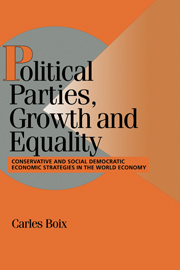 Political Parties, Growth and Equality
Political Parties, Growth and Equality Published online by Cambridge University Press: 05 June 2012
In the last two decades, under the impact of increasing international integration and two oil shocks, the developed world has suffered broad structural changes in its economy. Since 1973, the average Organization for Economic Cooperation and Development (OECD) annual growth rate, which had fluctuated around 5 percent in the 1960s, has dropped to 2.6 percent. Such a sluggish economic performance has been accompanied by different – and to some extent opposite – phenomena in each advanced nation. In continental Europe, which has a relatively regulated labor market and extensive social policies, the private sector has created few jobs in the last twenty years and the unemployment rate has jumped from less than 3 percent before 1973 to over 10 percent in the mid-1990s. By contrast, in the United States and, to some extent, in the United Kingdom, which have substantially lower levels of labor and welfare protection, employment creation has soared. Yet, unfortunately, they have had to pay a high price for their economic dynamism: median wages have declined and the income distribution has widened – in fact reversing a secular trend that started at the end of World War II.
The economic changes of the last two decades have, in turn, stirred up public life and galvanized the political debate within industrial democracies, hastening the alternation in power of different parties and encouraging experimentation with opposing economic policies in many advanced countries.
To save this book to your Kindle, first ensure no-reply@cambridge.org is added to your Approved Personal Document E-mail List under your Personal Document Settings on the Manage Your Content and Devices page of your Amazon account. Then enter the ‘name’ part of your Kindle email address below. Find out more about saving to your Kindle.
Note you can select to save to either the @free.kindle.com or @kindle.com variations. ‘@free.kindle.com’ emails are free but can only be saved to your device when it is connected to wi-fi. ‘@kindle.com’ emails can be delivered even when you are not connected to wi-fi, but note that service fees apply.
Find out more about the Kindle Personal Document Service.
To save content items to your account, please confirm that you agree to abide by our usage policies. If this is the first time you use this feature, you will be asked to authorise Cambridge Core to connect with your account. Find out more about saving content to Dropbox.
To save content items to your account, please confirm that you agree to abide by our usage policies. If this is the first time you use this feature, you will be asked to authorise Cambridge Core to connect with your account. Find out more about saving content to Google Drive.